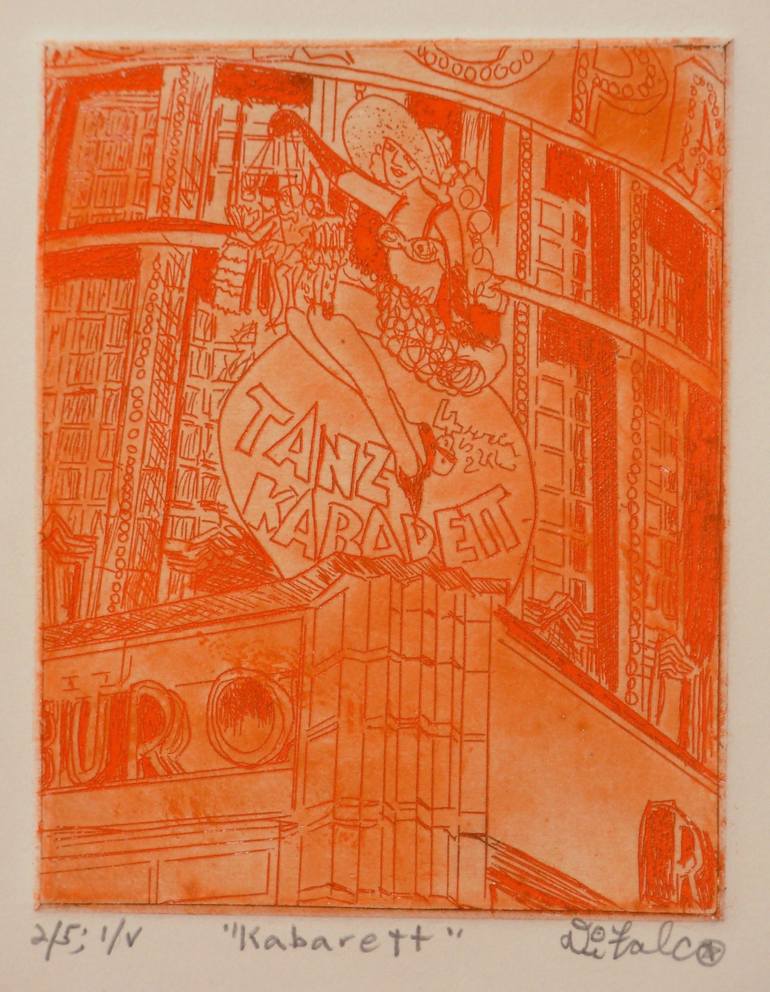


VIEW IN MY ROOM
KABARETT - Limited Edition 1 of 5 Print
United States
Printmaking, Etching on Paper
Size: 9 W x 12 H x 1 D in
Ships in a Box
Artist Recognition

Artist featured in a collection
About The Artwork
THE PRICE OF THIS ETCHING INCLUDES A BLACK PAINTED WOOD FRAME WITH GLASS AND ACID FREE MAT. THE FRAME MEASURES FOURTEEN INCHES HIGH BY ELEVEN INCHES WIDE. THE WHITE MAT CONTAINS A BLACK INNER TRIMMED EDGE. THE ARTWORK ARRIVES WIRED AND READY TO HANG ON YOUR WALL. A WALL HOOK AND NAIL ARE ALSO INCLUDED. The artist employed several studio techniques in this etching, including aquatint, intaglio, and drypoint. It is entitled “KABARETT” and belongs to Di Falco’s TEARS FOR BERLIN series, which is a collection devoted to The German Cabaret Art Movement from 1917 to 1933. It was executed on a zinc etching plate that measured four inches wide by five inches high or 10.160cm by 12.700cm, and the printing paper is hand trimmed to eight inches by ten inches. This etching is part of a portfolio of FIVE EDITIONS with each individual edition limited to only five prints. This work, from the FIRST EDITION, is executed in French, oil based etching ink and printed on French Rives BFK paper. This work was printed and published by the artist at the Center for Works on Paper in Philadelphia, Pennsylvania, on The Fleisher Art Campus, which is an art school for students and professional artists. The theme surrounds an architectural detail of a cabaret called The Europahaus, located on Stresemannstraße in Berlin, one of hundreds of cabarets in the city dating from 1931. The photographic image Di Falco used, as a study for several original drawings before the etching was executed, originated from The Digital Picture Archives of the Federal Archives or Bundesarchiv. Berlin was the central location in the 1930s for avant-garde and Dadaist performance art. The political satire inherent in the scripts added an artistic edge to the entertainment and theatrical aspects of CABARET. Many artists from the USA ,including Josephine Baker, flocked to Berlin to participate in this historic art movement. When the National Socialists came to power, the world of gay night-life and cabaret ended quickly.
Original Created:2018
Subjects:Performing Arts
Details & Dimensions
Printmaking:Etching on Paper
Artist Produced Limited Edition of:5
Size:9 W x 12 H x 1 D in
Frame:Black
Ready to Hang:Not applicable
Packaging:Ships in a Box
Shipping & Returns
Delivery Time:Typically 5-7 business days for domestic shipments, 10-14 business days for international shipments.
Handling:Ships in a box. Artists are responsible for packaging and adhering to Saatchi Art’s packaging guidelines.
Ships From:United States.
Have additional questions?
Please visit our help section or contact us.
United States
Imagery and storyline—both vital components of my creative process—enable me to create a form of visual poetry. Consequently, photography is intricate to my artistic strategy, especially with regard to my etchings. In view of this, many of my printed images—accomplished via the studio techniques of intaglio, aquatint, drypoint, and Chine collè—originate from my own photographs, as well as ones I uncover during research into the archives of academia, historical societies, and museums. Upon locating a scene that fascinates me, I first sketch a few original drawings of the likeness, and next transfer that drawing onto my prepared zinc etching plate. NOTE: In my etchings that incorporate the Chine collè process, I use mulberry bark paper from Thailand, which is infused with Japanese kozo threads. The paper is also treated with methylcellulose. I endeavor to establish links between the metaphysical and physical worlds . . . between the realms of dream and reality . . . and between the natural and the fabricated. In a sense, I believe that art unveils everything that we mask behind our assumptions and biases . . . or rather, those realms we neglect—or refuse—to perceive. My label for our failure to examine these areas is, “The Phenomenology of Non-Connectedness", which I blame on today’s communicational tools such as Social Media, the Internet, texting on smart phones, and “tweeting”. MY ETCHING TECHNIQUE I work on metal etching plates treated with both hard and soft grounds. These grounds consist of mineral spirits, beeswax, oil of spike lavender, and other natural substances. After these grounds dry, I draw images with needles and other tools onto the plate. Next, the exposed areas are “etched into” the zinc or copper plate in a bath of Nitric Acid and spring water. An artist’s proof in then printed after the plate is cleaned; Moreover, two to seven additional plate workings, acid baths, and proof printings occur before my desired effect is obtained. When satisfied with my end result, I apply oil based etching ink onto the clean plate and then remove the excess ink with several wipes. Next, I align my etching plate onto the printing press bed and cover it with papers and press blankets. Finally, the plate goes through the press to obtain my print. This process is repeated until all editions are created. I usually create three to five editions of five or six etchings for each one of my plates.
Artist Recognition

Artist featured by Saatchi Art in a collection
Thousands Of Five-Star Reviews
We deliver world-class customer service to all of our art buyers.
Global Selection
Explore an unparalleled artwork selection by artists from around the world.
Satisfaction Guaranteed
Our 14-day satisfaction guarantee allows you to buy with confidence.
Support An Artist With Every Purchase
We pay our artists more on every sale than other galleries.
Need More Help?